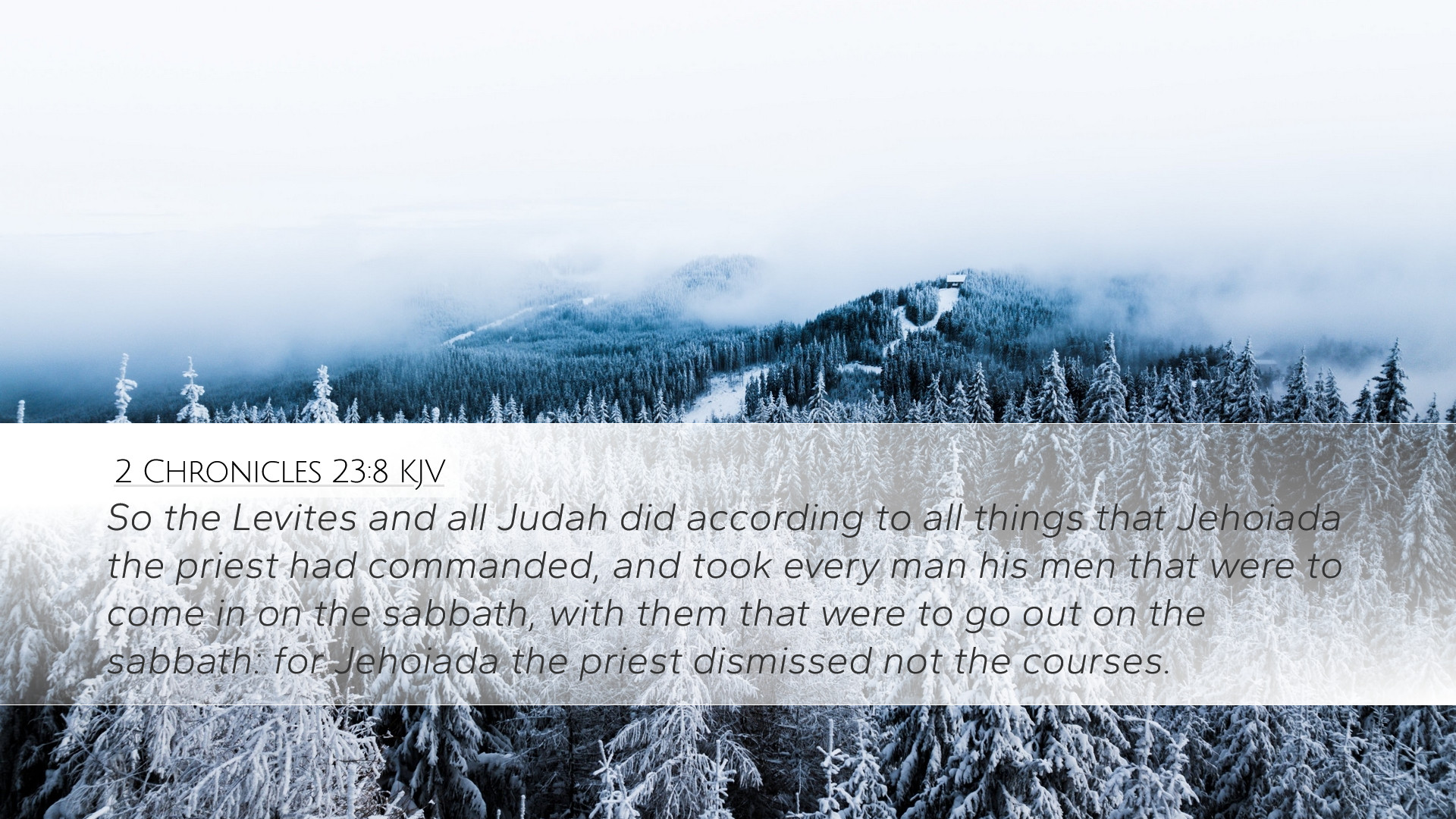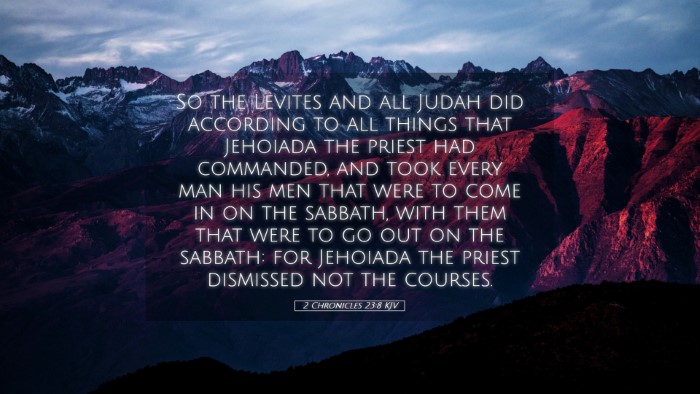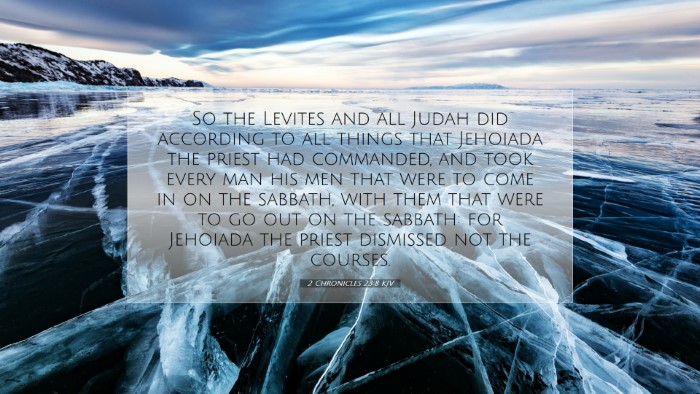Commentary on 2 Chronicles 23:8
Verse: "So the Levites and all Judah did according to all things that Jehoiada the priest had commanded, and took every man his men that were to come in on the Sabbath, with them that were to go out on the Sabbath: for Jehoiada the priest dismissed not the courses." (2 Chronicles 23:8)
Introduction
The account in 2 Chronicles 23 highlights a significant moment in the history of Judah, marked by the faithful leadership of Jehoiada the priest. This verse serves as a testament to the commitment and organization of the Levites and the people of Judah under the guidance of their priest. Drawing upon the insights from various public domain commentaries, we will explore the implications of this verse for leadership, faithfulness, and communal worship in the life of Israel.
Contextual Background
The larger narrative begins with the surrounding turmoil in Judah, particularly the reign of Athaliah, who had usurped the throne and led the nation into idolatry and despair. Jehoiada's key role as a priest reformer and a leader who restores rightful worship provides an essential backdrop for understanding the events leading to the execution of Athaliah and the installation of Joash as king.
Historical Context
The Levites, who were entrusted with the care of the temple and the conduct of worship, played a crucial role in the restoration of proper worship during this time of spiritual renewal. They are called upon to support Jehoiada’s plan, marking a turning point in Judah’s religious practices.
The Roles and Responsibilities of the Levites
In this verse, we see the Levites actively participating in the restoration effort, which speaks volumes about the nature of religious leadership and servanthood within the community.
Obedience to Leadership
As noted by Matthew Henry, obedience to spiritual leaders is paramount in maintaining order and reverence in worship. The statement, "did according to all things that Jehoiada the priest had commanded," illustrates the reverence and trust that the people had in their priest. This obedience is not mere compliance but a demonstration of faith in God’s appointed leaders, which is essential for communal harmony and effectiveness in worship.
Community and Cooperation
Albert Barnes emphasizes the cooperative spirit among the Levites and the broader community of Judah. Their gathering and participation highlight the importance of unity in worship and the functioning of the body of believers. Each one taking their assigned role reflects the structure and discipline necessary for successful execution of spiritual responsibilities, showing that effective ministry requires the collaboration of all members.
The Significance of the Sabbath
The mention of the Sabbath in this verse serves to underscore the established rhythms of worship that were crucial for the identity of the Israelite community. The observance of the Sabbath was not only a commandment but a covenantal sign of their relationship with God.
Spiritual Renewal and Reformation
Jehoiada’s leadership in rallying the Levites and the people to restore proper worship directly correlates to spiritual renewal. Adam Clarke provides insight into how the Sabbath served as a day of rest and reflection, allowing the community to refocus their devotion to God. This reestablishment of the Sabbath observance was vital in the overall process of renewing their covenant with God, as both a reminder of God’s creation and His deliverance.
The Dismissal of the Courses
The phrase “for Jehoiada the priest dismissed not the courses” indicates the careful management of worship and duties assigned to the priests and Levites. Each course had its time and responsibility not only to perform rituals but also to engage with the people.
Importance of Ritual in Worship
Ritual was integral to the life of Israel; as Matthew Henry notes, the continuation of the priestly courses prevents chaos in worship, ensuring that reverence and honor are maintained. The careful planning exhibited by Jehoiada enabled worship to continue unimpeded, emphasizing the importance of proper order in approaching a holy God.
Application for Modern Believers
This verse holds timeless truths that can benefit pastors, theologians, and students alike. The dynamics of obedience, community service, and the importance of maintaining a sacred rhythm in worship are lessons that transcend the historical context of Judah.
Obedience and Leadership
In contemporary church settings, pastors are called to lead with integrity and scriptural fidelity. The willingness of the people to follow Jehoiada’s instructions serves as a model for church members today—encouraging an attitude of respect and submission to God-appointed leaders while also holding them accountable to God’s Word.
The Role of Community
Furthermore, the collaborative effort of the Levites encourages a communal approach to ministry. Each church member has unique gifts and callings that are essential for the edification of the body, as depicted in Paul’s theology in the New Testament. The health of the church hinges on every believer understanding their part in the covenant community.
Maintaining Spiritual Rhythm
The significance of the Sabbath is a call for modern believers to establish rhythms in their lives that promote spiritual health. Just as the Israelites upheld the Sabbath, contemporary Christians are encouraged to take time for worship, rest, and reflection, allowing themselves to reconnect with God amidst a fast-paced world.
Conclusion
The narrative in 2 Chronicles 23:8 is rich with insights that are relevant for today's church. The collective resolve of the Levites, guided by Jehoiada, provides a model of faithful service and worship leadership. As pastors, students, and scholars reflect on this event, they are reminded of the necessity for shared responsibility in worship and the importance of maintaining spiritual order and rhythm in their communities. This verse not only speaks to the historical context of ancient Judah but also calls for a revival of obedience, community, and a deep commitment to God in our worship practices today.


